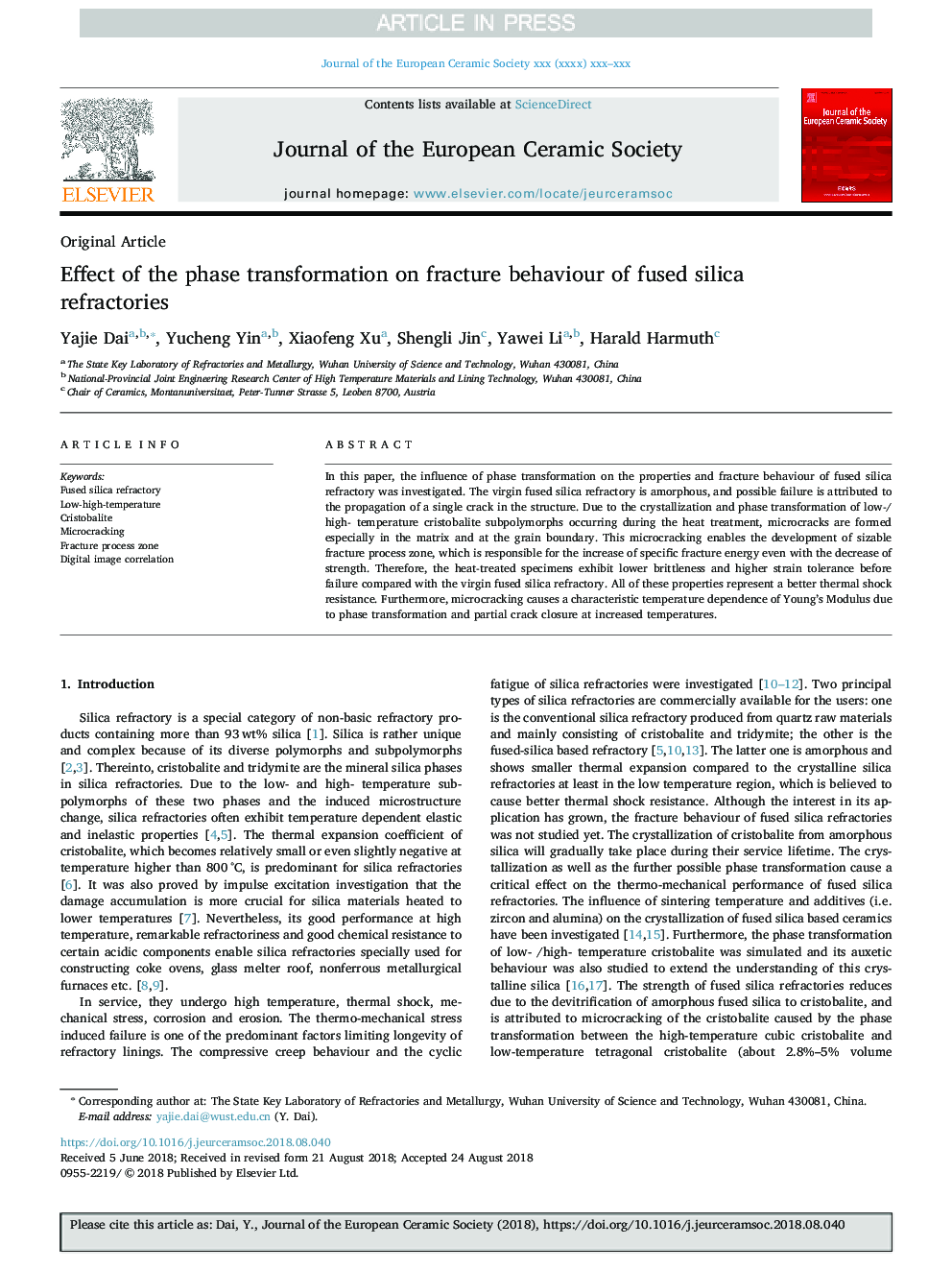| کد مقاله | کد نشریه | سال انتشار | مقاله انگلیسی | نسخه تمام متن |
|---|---|---|---|---|
| 10155511 | 1666351 | 2018 | 9 صفحه PDF | دانلود رایگان |
عنوان انگلیسی مقاله ISI
Effect of the phase transformation on fracture behaviour of fused silica refractories
ترجمه فارسی عنوان
اثر تحول فاز بر رفتار شکست نسوز سیلیس مخلوط شده
دانلود مقاله + سفارش ترجمه
دانلود مقاله ISI انگلیسی
رایگان برای ایرانیان
کلمات کلیدی
ترجمه چکیده
در این مقاله، تأثیر تبدیل فاز بر خواص و رفتار شکست نسوز سیلیکا متصل شده مورد بررسی قرار گرفته است. نسوز مقاوم در برابر سیلیکا باکره بی نظیر است و شکست احتمالی مربوط به انتشار یک ترک در ساختار است. با توجه به بلورسازی و انتقال فاز زیرپلیمورفهای کریستوبالیت کم و درجه حرارت بالا که در طول عملیات حرارتی اتفاق می افتد، میکروکراک ها به ویژه در ماتریس و مرز دانه تشکیل می شوند. این میکروکراکینگ باعث ایجاد منطقه ی فرایند شکافت قابل توجهی می شود که مسئول افزایش انرژی خاص شکست حتی با کاهش قدرت است. از این رو، نمونه هایی که تحت حرارت قرار می گیرند، شکننده تر و مقاومت بیشتری نسبت به سیلندر قبل از شکست در مقایسه با نسوز با کریستال است. تمام این خواص نشان دهنده مقاومت بهتر شوک حرارتی است. علاوه بر این، میکروکراکینگ موجب وابستگی دما به مدول یانگ به دلیل انتقال فاز و بسته شدن ترک جزئی در افزایش دما می شود.
موضوعات مرتبط
مهندسی و علوم پایه
مهندسی مواد
سرامیک و کامپوزیت
چکیده انگلیسی
In this paper, the influence of phase transformation on the properties and fracture behaviour of fused silica refractory was investigated. The virgin fused silica refractory is amorphous, and possible failure is attributed to the propagation of a single crack in the structure. Due to the crystallization and phase transformation of low-/high- temperature cristobalite subpolymorphs occurring during the heat treatment, microcracks are formed especially in the matrix and at the grain boundary. This microcracking enables the development of sizable fracture process zone, which is responsible for the increase of specific fracture energy even with the decrease of strength. Therefore, the heat-treated specimens exhibit lower brittleness and higher strain tolerance before failure compared with the virgin fused silica refractory. All of these properties represent a better thermal shock resistance. Furthermore, microcracking causes a characteristic temperature dependence of Young's Modulus due to phase transformation and partial crack closure at increased temperatures.
ناشر
Database: Elsevier - ScienceDirect (ساینس دایرکت)
Journal: Journal of the European Ceramic Society - Volume 38, Issue 16, December 2018, Pages 5601-5609
Journal: Journal of the European Ceramic Society - Volume 38, Issue 16, December 2018, Pages 5601-5609
نویسندگان
Yajie Dai, Yucheng Yin, Xiaofeng Xu, Shengli Jin, Yawei Li, Harald Harmuth,
